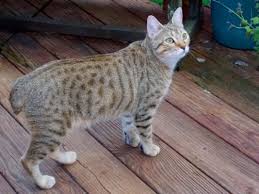
Desert Lynx
Conditions of detention
Desert Lynx cats are active and thrive in environments where they have plenty of space to explore and play. They enjoy having access to climbing structures, interactive toys, and areas where they can exercise their natural agility and curiosity.
Useful Fact:
Desert Lynx cats are known for their intelligence and playful nature. They enjoy interactive play and activities that challenge their minds, making them ideal companions for active households.
Nutrition and diet
Desert Lynx cats require a diet rich in protein to support their muscular build and high energy levels. High-quality commercial cat food, both wet and dry, is suitable, and fresh water should always be available.
Useful Fact: Given their active nature, Desert Lynx cats may benefit from a diet designed for athletic or energetic cats.
Health
Desert Lynx cats are generally healthy but can be prone to common feline issues such as obesity and dental problems if not properly managed. Regular veterinary check-ups are essential to monitor their health.
Useful Fact: Regular dental care, including brushing, can help prevent common dental issues in Desert Lynx cats.
Grooming and care
The Desert Lynx has a short to medium coat that requires minimal grooming. Weekly brushing helps remove loose fur and reduce shedding. Regular nail trimming and ear cleaning are also important.
Useful Fact: Their coat’s texture makes it less likely to mat, making grooming relatively easy.
Education and training
These intelligent cats are highly trainable and can learn tricks, commands, and even how to walk on a leash. Positive reinforcement techniques work best.
Useful Fact: Interactive training sessions that challenge their intelligence can keep them mentally stimulated and happy.
Toys and entertainment
Desert Lynx cats are active and playful, needing a variety of toys to stay entertained. Interactive toys, puzzle feeders, and climbing structures are ideal for this energetic breed.
Useful Fact: Regular play sessions help channel their energy and prevent boredom-related behaviors.
Safety
Ensure your home is cat-proofed to prevent accidents. Keep toxic plants, small objects, and dangerous substances out of reach. Secure windows and balconies to prevent falls.
Useful Fact: Providing a safe, enclosed outdoor space can satisfy their curiosity and desire for exploration.
Accessories
Essential accessories for a Desert Lynx include a sturdy scratching post, comfortable cat bed, and interactive toys. Grooming tools like a brush and nail clippers are also necessary.
Useful Fact: A tall cat tree or climbing structure can provide the exercise and vantage points they enjoy.
Socialization
Desert Lynx cats are social and enjoy interaction with their human families and other pets. Early socialization helps them become well-adjusted, confident adults.
Useful Fact: These cats can become lonely if left alone for long periods, so companionship is important.
Travel and Transportation
When traveling, use a secure and comfortable cat carrier. Acclimate your cat to the carrier well in advance of travel to reduce stress.
Useful Fact: Including familiar items like a favorite blanket or toy in the carrier can help ease travel anxiety.
Behavior and psychology
Desert Lynx cats are affectionate, playful, and enjoy being the center of attention. They may develop behavioral issues if they feel neglected or bored.
Useful Fact: Providing ample playtime and affection helps prevent destructive behaviors and keeps them happy.
Legal aspects
Ensure your Desert Lynx is microchipped and registered according to local laws. This helps with identification if they ever get lost.
Useful Fact: Knowing local pet ownership regulations can prevent legal issues and ensure your pet’s safety.


